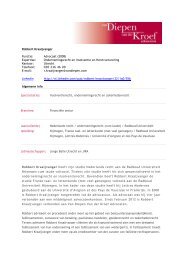Writ of summons - Van Diepen Van der Kroef
Writ of summons - Van Diepen Van der Kroef
Writ of summons - Van Diepen Van der Kroef
You also want an ePaper? Increase the reach of your titles
YUMPU automatically turns print PDFs into web optimized ePapers that Google loves.
un<strong>der</strong> customary law. A duty on states arises from this right, being the obligation to takemeasures for the protection <strong>of</strong> the lives <strong>of</strong> civilians against attacks by other privatepersons. This obligation certainly holds in the event <strong>of</strong> serious threat such as large-scaleviolence (see, A. Simon, op. cit., page 171 et seq.). Without this obligation actively totake measures the right to life would not be sufficiently guaranteed. This duty holds als<strong>of</strong>or UN troops in a Safe Area, at least to the extent that the troops have assumedgovernmental tasks (see, R. H<strong>of</strong>mann, op. cit., page 16 and A. Simon, op. cit., pages 175and 176). In Srebrenica Dutchbat had, according to UN resolution 836, the task, interalia, <strong>of</strong> preventing attacks against the Safe Area. According to the Secretary-General <strong>of</strong>the UN Dutchbat’s principal task was the protection <strong>of</strong> the civilian population (see,Report <strong>of</strong> the Security Council established pursuant to resolution 844, 1993, <strong>of</strong> 9 May1994, (S/1994/555), page 5 number 16). The UN was consequently obliged as aminimum to protect the population against large-scale attacks on life and health (see, A.Simon, op. cit., page 176).414. The duty <strong>of</strong> protection owed by a UN force is restricted to the means that are available toit and to the measures that may reasonably be expected <strong>of</strong> it (see, A. Simon, op. cit.,page 177). There is thus a serious charge against the State <strong>of</strong> the Netherlands inherent inthe armament chosen for Dutchbat. The UN was obliged to prevent the capture <strong>of</strong> theSafe Area and the resulting mass mur<strong>der</strong> with assistance <strong>of</strong> the means at its disposal.Plaintiff and the Foundation conclude that Dutchbat and the State <strong>of</strong> the Netherlandswere not prepared, however, to protect the Safe Area against Serb attacks. Plaintiff andthe Foundation hold it against Dutchbat that the observed atrocities were not reported.Dutchbat fulfilled the obligations so inadequately that the UN and the State <strong>of</strong> theNetherlands are liable. Plaintiff and the Foundation hold the UN liable for itsunresponsive attitude to the provision <strong>of</strong> air support, the calling-<strong>of</strong>f <strong>of</strong> air support, theabsence <strong>of</strong> a defence plan and an evacuation plan, poor information management and afaulty assessment <strong>of</strong> the situation. All this is also held against the State <strong>of</strong> theNetherlands (see, A. Simon, op. cit., page 178 through 181). These various matters ledto the right to life <strong>of</strong> the mur<strong>der</strong>ed family <strong>of</strong> Plaintiff and the mur<strong>der</strong>ed family <strong>of</strong> thepersons whose interests are promoted by Foundation being breached.© <strong>Van</strong> <strong>Diepen</strong> <strong>Van</strong> <strong>der</strong> <strong>Kroef</strong> Advocaten 2007www.vandiepen.com173
















